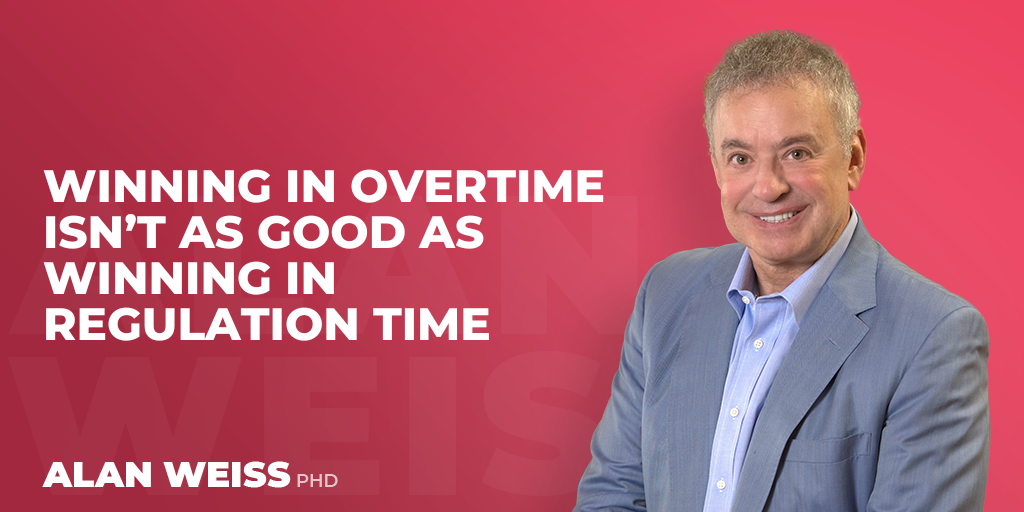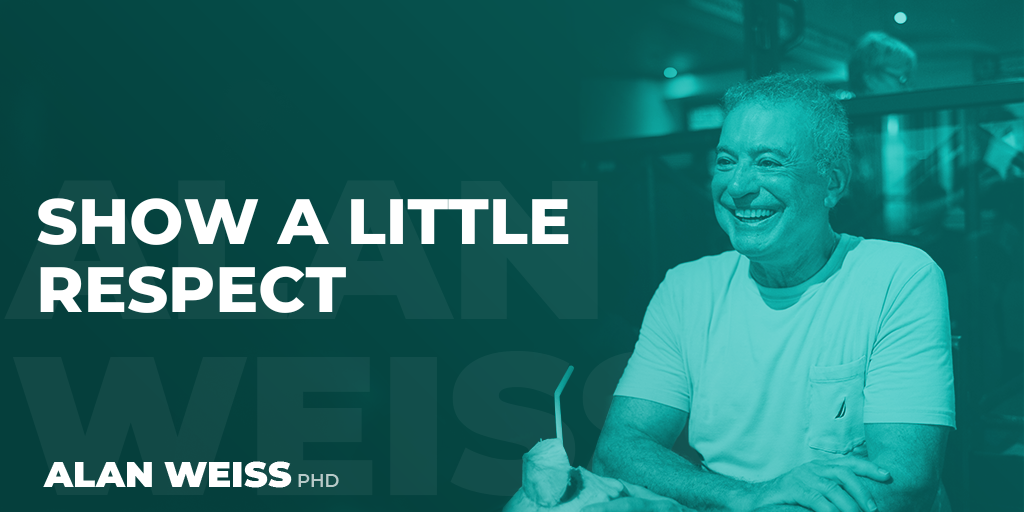Identity Crisis
From 36,000 feet, posted from a Delta jet with wifi:
I’ve counseled hundreds of people who have involuntarily lost their jobs. And I’ve found a fundamental difference among those who are resilient and those who are desperate.
I had been asked by a mutual friend to give advice and counsel on how to become a high-level consultant to the former vice chair of a major bank whose division was merged into another, and who was given both a large severance and his walking papers. He had been making well over a million a year. I despise doing things like this for free (Would a banker give me free investment advice?), but I capitulated and agreed to a breakfast.
While I listened to him, he sounded exactly like a vice chairman still, which is not good, so as the omelets arrived I unleashed one of my prime questions. (Prime questions are those so basic and direct that they require an honest answer which will inform you immediately about the likely need or outcome. There are 13 such prime questions. No, I will not reveal the other 12, because I really do get paid for such things.)
“If you were offered the presidency of a major division at Bank of America, or one of their vice chairmanships, at about the same money as you were making before, would you accept?” (The prime question: “Would you return to the status quo antebellum?”)
“In a Brooklyn minute,” he hissed at me.
“Then let’s enjoy breakfast,” I said, “because we have zero to talk about in terms of you becoming a consultant.”
The fundamental difference between resilience and depression is in your choice of identity. If you choose to identify with your job title—whether plumber, branch manager, or vice chair—you will tend to lose your identify when you lose your business card or your wrench. But if you identify yourself—define yourself—in terms of your contribution, then your identify is intrinsically yours, transportable, and self-worth-maintaining. (“I create sustainable and efficient home environments”; “I provide for maximum service to create loyal customers in highly competitive business environments”; “I create and implement strategies that propel organizations beyond competitive challenges.”
The vice chair wanted to be a vice chair, period. That was his programming. I wasn’t being paid enough—hell, I wasn’t being PAID—to deprogram him.
I’m not a consultant. I’m someone who improves my client’s conditions, increasing both individual and organizational performance. HR people call me a consultant, and accounts payable people call me a “vendor.” That’s why I don’t deal with them, nor bother to try to educate them. My clients (buyers) call me a “partner.”
Don’t identify with your inputs, tasks, job description, deliverables, or business card title. They are ephemeral and are commodities. Identify with your outputs, results, and the degree to which you improve others. Those are permanent and highly valuable.
When Bjorn Borg won five Wimbledons in a row, six French Opens, and 90 percent of all of his grand slam singles matches (modern era records), a star competitor said, “The rest of us are playing tennis. He’s doing something else.”
Define what you do in terms of contributions and no one can ever take that away from you, no matter what. And you’ll be far more enthusiastic and aggressive in finding a new home for it. I was fired once by someone very wealthy and absolutely clueless. I swore that would never happen again because I knew what I could create for clients.
Control your own identity and you’ll control your own destiny.
© Alan Weiss 2010. All rights reserved.






Garry Beavis
I need this constantly drummed into my head to keep reminding me that the first sale is always to myself. Thanks Alan.
Arnoldo Chavez
Alan:
You are totally right; it is not your title what defines you, but the difference you can make in your environment. As you have stated: it depends on your level of self esteem.
Great post!
Simon
I read that more than once. This is important stuff!
I’m not an accountant, I’m …
Wendy Kinney
Thank you for sharing a Prime Question. The concept, and the jump start, are both valuable to me.
Gratefully, W!
Jeffrey Summers
How much for the other 12?
Philippe Back
Dead on.
I am surely going to use that one at times 🙂
Salvador Guerrero
I has being told that Hernan Cortes fired his three ships anchored at Veracruz, Mexico, to show his soldiers about their only choice: to win their battles, and stop thinking about going back to Spain! Their only choice? To win !!
Alan Weiss
Speakers often identify themselves as “speakers.” When asked, “What do you speak on?” (a stupid question) they stupidly reply something like, “Sales closing time.” So in 15 seconds they’ve identified themselves as a common commodity that might be purchased like potatoes by the HR people. Happening every day.
Do you build house extensions, or are you an architect, OR are you someone who improves the living environments and quality of life for families?
Michael
One of your best pieces Alan. Gets to the heart of the matter. “Who are you?” and “Where are you going?” Thanks.
Trent
Thank you very much! I was struggling with defining my “objectives” without having taken the time to understand who I am. After only a few minutes thinking through my contributions as you put it, it’s become much easier to see where I want to go.
Chris Flanagan
A long time ago I stopped asking people what they do. It automatically generates the proverbial job title answer. Instead, I ask ‘what are you working on?’ No surprise, business people have the hardest time answering the question. 🙂
Jim Powell
Lovely blog post Alan.
I know we differ on certain areas of sales, but it does remind me of the line I know we all hear from prospects which is “what will you do for my company”. My reply is usually after a pause and a wrinkle “what were you hoping I could do” – normally starts the flow of conversation and revelaing some of there issues.
Alan Weiss
The real issue of course is “How will your company be improved,” not “what will we do.” We differ on sales? I don’t think I’m familiar with what you’re talking about, but I’m sure you’ll come around eventually!
Neil
Well Said!
It is the first and important barrier to cross-over to the other world!